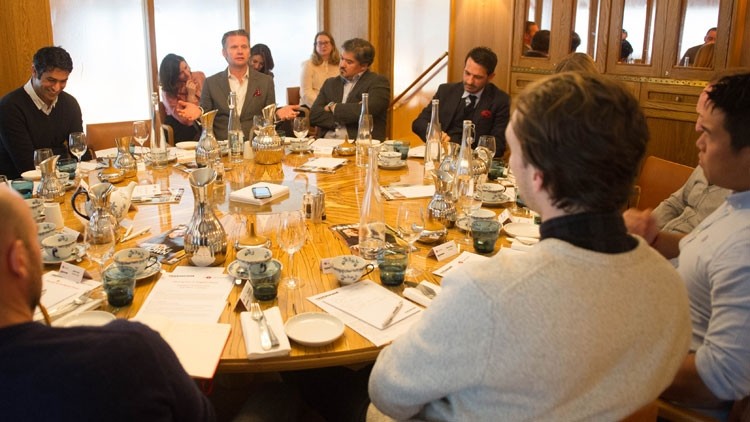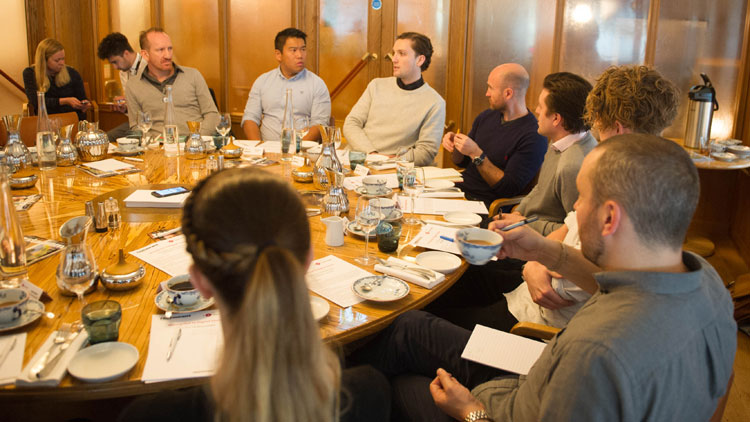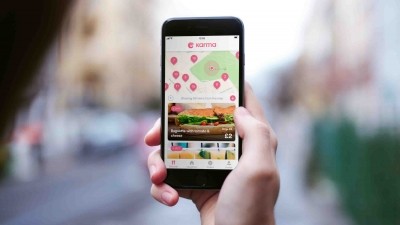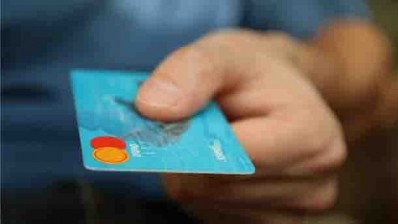Dining out in digital times

How are diners making reservations?
Paulo de Tarso: 50% of our bookings come through OpenTable and the rest either book on our website or on the phone. We find we get the most phone calls from our regulars. We have 9,822 people signed up to our newsletter and they are continually booking online.
Adrian Valeriano: More and more people are starting to book using their mobile phones. Our latest data shows that more than 47% of reservations originate on a mobile phone – that’s massive. You need to be partnered with someone who helps you do that in order to capture new business, whether it be tourists or regulars thinking about where to eat that week. They have so many choices so you need to be searchable and discoverable in that space.
Rik Campbell: We try and push everyone through the website as the phone never stops ringing – around 80-85% come through the website. It’s a little bit more impersonal but we try and make up for it when they come into the restaurant. Otherwise we need to have someone on the phone all day just answering silly questions. We are about to upload a new website and are looking to improve the mobile app as much as possible and trying to push people to it as it means less work for us.
Raz Helalat: At Brighton Coal Shed, we have a slightly older clientele, and 70% of bookings are on the phone, while at the Tower Bridge site 70% of bookings are online. At The Salt Room [in Brighton], it’s 50:50 in terms of online versus the phone.
AV: We are seeing a massive shift in phone reservations versus online. Online is on the increase. In major cities, such as Berlin and London, phone reservations still constitute the largest part of people’s business but online is growing quickly. And when you look at markets like New York, online reservations have surpassed phone reservations. A lot of other markets will look to replicate this as they grow and mature. Social media is also super important. People are looking at Facebook and Instagram so facilitating that kind of connection with your guests is vital.
PDT: We use social media a lot as well. People are pressing the button in Instagram and Twitter when we make a post and that goes through to our website.
Claire Woodmason: Our clientele is quite irregular. Around 70% of people make a phone reservation but a lot of people call in personally to book in. We have someone on the phone across our three sites [Trinity, Trinity Upstairs and Bistro Union].
RC: We take credit card details for bookings and people start getting nervous when you ask them for their card details over the phone. Until someone inputs their details and gets a reservation email they do not have a booking. It’s cleaner and easier to do it online. It means we can easily check if people have a booking.
"Almost a third of the UK
factors dining out
options into their
choice of holiday
destination"
How are diners finding your restaurant?
PDT: When I found the location [for Margot] nobody really walked the streets but footfall is now increasing. One year on and we have just put our blue awnings up – before that we had no visual – and it is now much easier for people to find us. There are 6,000 attorneys in Covent Garden, we have been building relations with the law firms in the area, getting to know them and encouraging them to come to us.
RH: The postcode given to us for our new restaurant sent people to the wrong place. It also doesn’t help that there is still no signage up [at One Tower Bridge]. We are relying on our social media to direct people to the restaurant as well as marketing and newsletters. We have over 45,000 people on our mailing list, which is helping. We’ve invited everybody working or living in a half-mile radius but we’re still having to work very hard to get people in because the development isn’t finished.
Philip Hamilton: We’ve had a huge problem with St James’s Market, people think it’s by St James’s Square but it’s not. If you tell people it’s off Haymarket, they know about it. This is where Crown Estate has gone wrong, it has tried to make it too posh. So we’ve had to do a lot marketing, initially in paper media such as Metro and Evening Standard.
Alice Henderson: The postcode of our new restaurant in Battersea Power Station isn’t right either so we’ve had to use a different one. We have tried to send emails to as many people as possible but often they don’t read things.
Do you track what online content diners are engaging with?
Walter Lecocq: When people are in the process of making a booking there is an element of time. People don’t have six minutes to spend double checking your restaurant is what it should be. You have to polish your image where people can see you. If someone is going to spend 30 seconds Googling your website, what does it show them? Your website needs to show people what special things you are doing, whether it be through menus or imagery. We are currently relaunching our website to try and combine elements that make it more immediate.
AV: A diner only has so many hours in the day. Your content on the various online platforms needs to be relevant in the customer decision making process of where to go out to eat.
PDT: Our website is the main online platform
for us. It’s very visual. There’s stories and pictures on there. We focus on food, front of house and the history of Margot and tell those stories about the restaurant.
James Lewis: I’m not sure people are that interested in stories, they are more concerned with what they might be able to eat: 90% of click-throughs to our booking system are from menu pages.
AH: We relaunched our website nine months ago. It is fascinating to see the keywords that people are using to find us and how we can improve on them.
AV: Some restaurants feel they need to do all the heavy lifting themselves. Some 79% of bookings that we send are first-time diners, so OpenTable is a discovery platform that enables restaurants to reach new people. The question is, what are diners interested in? More than ever before they are researching and trying to discover what the experience in your restaurant will be like before they even get there. More than 40% of diners we surveyed said that seeing a picture on a restaurant’s profile page helped them understand if it was the place for them and 42% are looking at what experience is on offer – not a discount but what might resonate with them in terms of something they haven’t tried before. There’s a huge appetite for that.
Reviews and feedback
AV: Having verified reviews of your restaurant is important. Verified reviews have a lot more credibility and they really help drive people to your restaurant. We process more than one million verified reviews every month.
AH: The topic of reviews is a really interesting one and something we hone in on. I don’t like TripAdvisor but I realise people do use it in their decision-making process. If I saw a restaurant with a four-star review and one with a four-and-a-half-star review, I’d probably go for the one with the better rating without thinking too much about it.
WL: I’m not sure people read as many reviews as you think. They tend to stick to the overall mark.
Joel Falconer: We are often too quick to dismiss these online review platforms. They give us a huge amount of feedback that we have the opportunity to engage with. We generated 250 reviews across the business last week. If 250 people are bothering to tell you what they think of your business then you should listen to them. Some just want a comp, some of it is bollocks, sometimes it’s just a rant – but if you listen closely there are messages you should be paying attention to. About 85% of our reviews last week were positive.
RH: We use comment cards and 90% of feedback is always really positive. But all these great comments are not transferred online, people tend to save that for the negative comments.
We respond to every single online comment, good or bad.
RC: You’ve got to encourage people who like you to write a review. We started asking people who enjoyed Kricket to leave a review on TripAdvisor and we have seen an upturn in positive reviews.
Chris Bunt: Everyone who books with an email get as email after they have dined with us asking for feedback and we reply to every email on a personal level. It cuts off that opportunity for people to vent on TripAdvisor as they are venting at me instead.
"More than ever before
people are trying to
discover what the experience
will be in your restaurant
before they get there"
Do you get travellers to your restaurant?
AV: Our research shows that 13% of London restaurant traffic is from people who don’t live in London – and these are national as well as international travellers. Almost a third (31%) of the UK factors dining out options into their choice of holiday destination. Some 73% say they spend more when they travel with 97% saying they eat out at least once and 48% at least twice – these are great stats. We are able to show our restaurant partners where their traffic is coming from and what percentage of the reservations came from international destinations. It helps restaurants understand how they are being found, who is finding them and what the value of the diners who are coming in is. That is a key piece of information that restaurants need visibility on.
PDR: The amount of Japanese and US travellers that are finding us is amazing, I think they are being sent from the hotels. They are spending a good amount of money and are coming back again and again.
AV: With New Yorkers, 9% of the time they are asking for something special versus 25% of British diners across our network asking for special requests, and yet 19% of New Yorkers leave an online review. So you want New Yorkers in your restaurant – they ask for less up front and leave reviews at the end.
Last-minute bookings
JF: We encourage last-minute decisions. Walk-ins often get short shrift, but if you establish a reputation as a restaurant that never has space for walk-ins then people won’t come.
PDT: Walk-ins are really important. You have to do all you can to take them, however full you are. I worked at Bar Boulud [in Mayfair] for six years and never turned a table away.
AH: We work with hotel and resident concierges and hold seats back for them [at One Tower Bridge]. On a Sunday night, the clientele there is pretty much all residents.
AV: We don’t allow individuals to make multiple reservations but we have a programme for PAs that prevents no-shows and overbooking but allows them to make multiple reservations. There’s a perception that it’s the Wild West online but in reality it isn’t. At OpenTable we bring a lot of accountability to the booking process.
RC: We don’t hold back tables for hotel concierges with VIPs.
CW: We do about 500 covers a month from hotels.
AV: In terms of filling a restaurant last minute, OpenTable is a great resource to leverage. 35% of the mobile reservations made on the same day in London are within 90 minutes. Restaurants can look at overbooking but understand how to do it successfully by looking at historical data. They should be asking: ‘what does my no-show rate look like, how can I hedge against that and be
a bit more aggressive?’ They also need to teach staff to say yes more.
About OpenTable
OpenTable, part of The Priceline Group (NASDAQ: PCLN), is the world's leading provider of online restaurant reservations, seating more than 24 million diners per month via online reservations across more than 43,000 restaurants. The OpenTable network connects restaurants and diners, helping diners discover and book the perfect table and helping restaurants deliver personalised hospitality to keep guests coming back. The OpenTable service enables diners to see which restaurants have available tables, select a restaurant based on verified diner reviews, menus, and other helpful information, and easily make a reservation. In addition to the company's website and mobile apps, OpenTable powers online reservations for nearly 600 partners, including many of the Internet's most popular global and local brands. For restaurants, the OpenTable hospitality solutions enable them to manage their reservation book, streamline their operations, and enhance their service levels. Since its inception in 1998, OpenTable has seated over 1.4 billion diners around the world via online reservations. OpenTable is headquartered in San Francisco and has bookable restaurants in more than 20 countries, including Australia, Canada, Germany, Ireland, Japan, Mexico, the Netherlands, United Kingdom and the United States. Restaurants are available for reservations in Dutch, English, French, German, Japanese, and Spanish languages.
https://restaurant.opentable.co.uk/?mid=RestaurantMagazine&ls=Partner_Mktg&utm_source=Partner&utm_medium=Advertising&utm_campaign=RestaurantMagazine






















